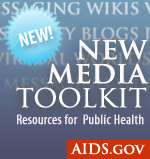Blogging about Blogs (Part 2 on Blogging)
While we’ve reflected on whether we think our blog is working, we’ve never posted on blogging basics--so that is the focus of today’s post.
What is a blog?
According to Wikipedia  , “A blog is a website
, “A blog is a website  ...with regular entries of commentary, descriptions of events, or other material, such as graphics or video. Entries are commonly displayed in reverse chronological order.” Blogs can be written by individual or multiple authors. This AIDS.gov blog is a team effort-- team members collaborate to bring government, public health, and new media perspectives to each post.
...with regular entries of commentary, descriptions of events, or other material, such as graphics or video. Entries are commonly displayed in reverse chronological order.” Blogs can be written by individual or multiple authors. This AIDS.gov blog is a team effort-- team members collaborate to bring government, public health, and new media perspectives to each post.
Blogs are usually informal--taking on the tone of a diary or journal entry. Some blogs are very personal, while others provide mainstream news updates. Most blogs encourage dialogue with their readers through the use of comments. Common Craft talks about the value of blog comments in their video, Blogs in Plain English  : “Each blog post can become a discussion through comments left by readers. Blogs make the news a two-way street.”
: “Each blog post can become a discussion through comments left by readers. Blogs make the news a two-way street.”
What are some of the benefits and challenges of blogging?
Blogs provide opportunities for an individual or organization to share information and engage in conversation. Problogger  says, “Whole blog communities have sprung up...putting people into contact with each other in relationships where they can learn, share ideas, make friends with--and even do business with--people with similar interests from around the world.”
says, “Whole blog communities have sprung up...putting people into contact with each other in relationships where they can learn, share ideas, make friends with--and even do business with--people with similar interests from around the world.”
For the AIDS community, benefits might include reaching your clients with important HIV information, like David Wessner’s blog, The AIDS Pandemic  . Poz.com blogs
. Poz.com blogs  are autobiographical stories of people living with HIV/AIDS. James Daugherty’s HIV and AIDS News
are autobiographical stories of people living with HIV/AIDS. James Daugherty’s HIV and AIDS News  provides up-to-date information, while chronicling his experiences living with HIV.
provides up-to-date information, while chronicling his experiences living with HIV.

Dr. Kevin Fenton
We recently spoke with Dr. Kevin Fenton, Director of the Centers for Disease Control and Prevention’s (CDC) National Center for HIV/AIDS, Viral Hepatitis, STD, and TB Prevention. Dr. Fenton told us, “We are launching a blog to engage the public, our grantees and partners in exchanging ideas about HIV, Hepatitis, STD, and TB prevention and our efforts to reduce health disparities, increase program collaboration and service integration, and to enhance global efforts to control these diseases.”
While there are many benefits to blogging, there are also challenges. For one, maintaining a blog takes time (as a government blog, we go through an additional step of having our content go through clearance). And opening up your blog for comments implies a level of transparency that might be challenging for some organizations.
At AIDS.gov, we try to be as transparent as possible and post all comments, as long as they are in accordance with our comment policy, which includes not posting comments that contain vulgar language, personal attacks of any kind, or offensive terms that target specific individuals or groups. We also do not post comments that are clearly off-topic or that promote services or products. Some of our greatest lessons and insights have come from people commenting on our blog.
Want to learn more about blogging?
As with most new media tools, we recommend getting your feet wet. Explore the blogosphere  . Read blogs. Comment on blogs. Subscribe to some of the ones that you find interesting. As of June 2008, the blog search engine, Technorati
. Read blogs. Comment on blogs. Subscribe to some of the ones that you find interesting. As of June 2008, the blog search engine, Technorati  , has indexed over 112 million blogs, so you have a lot to choose from!
, has indexed over 112 million blogs, so you have a lot to choose from!
The AIDS.gov team has learned a lot about new media and blogging from Beth Kanter’s Beth’s Blog  : How Nonprofits Can Use New Media, Katya Andresen’s Nonprofit Marketing Blog
: How Nonprofits Can Use New Media, Katya Andresen’s Nonprofit Marketing Blog  , Nedra Weinreich’s Spare Change
, Nedra Weinreich’s Spare Change  blog, and Olgilvy’s 360 Digital Influence
blog, and Olgilvy’s 360 Digital Influence  -- they recently wrote about blogging in the government, mentioning some Federal colleagues’ blogs, such as Secretary Mike Leavitt’s Blog and CDC’s Health Marketing Musings blog, written by Dr. Jay Bernhardt.
-- they recently wrote about blogging in the government, mentioning some Federal colleagues’ blogs, such as Secretary Mike Leavitt’s Blog and CDC’s Health Marketing Musings blog, written by Dr. Jay Bernhardt.
And don’t forget your strategy. Identify your target audience. Determine your objectives and strategy. Problogger’s 23 Questions for Prospective Bloggers  can help you determine if blogging is right for you or your organization.
can help you determine if blogging is right for you or your organization.
If you decide to start a blog, there are many free services to help you get started. Some of the most common ones include Blogger  , Typepad
, Typepad  , and Wordpress.
, and Wordpress. 
As we mentioned in last week’s post, blogging has been an incredible learning experience for us. Whether you decide to start your own blog or continue to read and comment on others’ blogs, we’d love to hear from you!
Stay tuned for next week’s post when we conclude our three-part series on blogging--we’ll be speaking with three HIV/AIDS bloggers!
If you enjoyed this post, please consider leaving a comment or subscribing to the feed to have future articles delivered to your feed reader or email.




Thanks so much for your kinds words. This is an excellent post for people just getting into blogging. Thanks so much for sharing it.
Posted by: Beth Kanter | July 18, 2008 at 09:22 AM
This is great information for individuals or organizations considering starting a blog. Having a blog takes dedication and transparancy. I think organizations and companies entering the blogosphere and being transparent are going to be more succesful than companies who do not get involved. Its amazing how much we can all learn from eachother's blogs!
Posted by: Patricia Beck | July 22, 2008 at 12:51 AM
Everybody wants a blog but few are willing to invest time and money to make a blog useable.
thanks for the advice
Posted by: search channel | July 24, 2008 at 08:47 AM
I was able to start our blog at my company and found your advice to be very helpful. Thanks!
Posted by: Michael Payday | July 25, 2008 at 06:06 PM
well i have started some what blogging and it relieves my pressure a lot it make me feel like saying to the whole world what i feel and see.I am from one of the country which is facing this aids problem i.e india it is better if people try to remain safe and secure by their acts and using information can help it out.
Posted by: optimisation | July 26, 2008 at 08:53 AM
This is wonderful, I want to thank you for the effort you have put into the cause. Teaching people how to use technology to spread the word is a great idea.
Posted by: Jon Lehr | August 13, 2008 at 06:56 PM
Being an amateur blogger myself, I think that the post covers most aspect of blogging for beginners. Thanks for covering the subject on blogs.
Posted by: unoblogger | February 27, 2009 at 03:35 AM
Thanks so much for this, great post for people who are really just beginning to get into blogging and asking themselves, what on earth is a blog anyway? I just found out it was a good way to have a free site on blogger!
Posted by: Naruto | April 15, 2009 at 08:28 AM